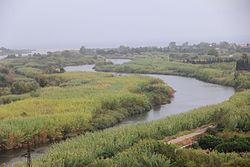| Cedrino | |
|---|---|
 Cedrino near Orosei | |
 | |
| Location | |
| Country | Italy |
| Physical characteristics | |
| Source | |
| • location | Monte Fumai (Gennargentu massif) |
| • elevation | 1,316 m (4,318 ft) |
| Mouth | Gulf of Orosei |
• location | near Orosei |
• coordinates | 40°22′47″N9°44′23″E / 40.3796°N 9.7397°E |
| Length | 80 km (50 mi) |
The Cedrino is a river that flows in the province of Nuoro, in central-eastern Sardinia. Grazia Deledda talks about the river in various novels, including Canne al vento. [1]
According to the historian Vittorio Angius, the name (Cedrus, Cedrinus, already mentioned by Ptolemy) derives from the luxuriant presence of cedar plants that have existed since Ancient Rome. [2]